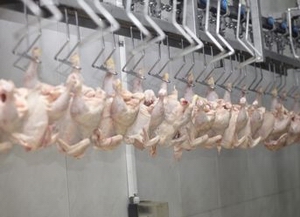 ter Watch, a Washington, DC-based advocacy group, said Monday it’s concerned about the way the U.S. Department of Agriculture is regulating meat imports following last weekend’s recall of nearly 200,000 pounds of imported chicken for dioxins – toxic pollutants that can pose a public health risk.
ter Watch, a Washington, DC-based advocacy group, said Monday it’s concerned about the way the U.S. Department of Agriculture is regulating meat imports following last weekend’s recall of nearly 200,000 pounds of imported chicken for dioxins – toxic pollutants that can pose a public health risk.On Saturday, the USDA’s Food Safety and Inspection Service issued a public notification announcing that health authorities in Chile had recalled 188,522 pounds of chicken that had been shipped to the United States over concerns about dioxins. According to Google news, the recall was not picked up by any mainstream media outlets — likely because it was released on a Saturday and the agency said the risk to consumers is “negligible.”
Food & Water Watch is now calling on FSIS to answer a number of questions about the incident. The group wants to know whether there was lag time between when the agency learned of the Chilean recall and when the press release went out Saturday, and what role FSIS port-of-entry inspection played in identifying the problem.
In a release, Food & Water Watch points out that a 2012 FSIS audit of the Chilean meat safety system found Chilean food safety officials were bolstering staff training on dioxin contamination. The group wants to know how long dioxin contamination has been an issue with imported products from that country and why. Considering dioxins are highly toxic, the agency didn’t issue a recall or even a public health alert to “accurately reflect the severity of the problem,” a fact Food & Water Watch finds odd.
FSIS said Saturday about 126,082 pounds of the product in question is being held at the border, so it has not entered commerce.
“The agency is investigating the distribution of the remaining 62,440, pounds and verifying if additional shipments are involved,” read the announcement. “FSIS may expand the public notification and will take necessary and appropriate action after analyzing updated information received from the government of Chile.”
FSIS said it was issuing a public notification to “make the public aware of the situation,” but the agency is not formally announcing a recall because “the establishment most directly associated with producing the adulterated product has recalled product and USDA works with its counterparts to conduct effectiveness checks in U.S. In this case, the Chilean Ministry of Health initiated a recall of this product.”
According to the World Health Organization, more than 90 percent of human exposure to dioxins is from food, which is why many countries monitor their food supplies for contamination. Over the past decade there have been multiple large-scale international dioxin recalls, usually stemming from contaminated animal feed. Dioxins occur naturally in the environment from volcanic eruptions and forest fires, but are also the result of industrial processes. The compounds can cause developmental and reproductive problems, according to WHO.
FSIS says it conducted an analysis of the Chilean test results and “determined that the risk to consumers is negligible,” but the agency has not announced the levels found. FSIS is continuing to track down where the product was distributed.





